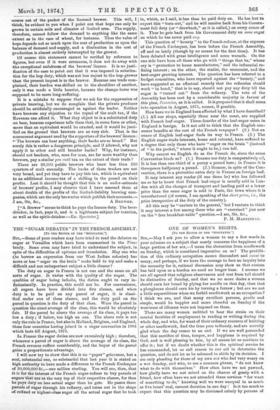THE "SUGAR DEBATES" IN THE FRENCH ASSEMBLY.
[TO THE EDITOR OF THE "SPECTATOR.") SIR,—Some of your readers may have tried to read the debates on -sugar at Versailles which have been summarised in the Times lately. Some even may have tried to understand the subject, in spite of the difficulties of epitome and translation. May one who (to borrow an expression from our West Indian colonies) has more or less " sugar on the brain " make bold to try and make a difficult and not unimportant subject a little clearer ?
The duty on sugar in France is not one and the same on all sorts of sugar. It varies with the quality of the sugar. The qualities of sugar being infinite, the duties ought to vary in- finitesimally. In practice, this could not be. For convenience, all sugars have been divided into five classes, and when -duty is to be paid on any parcel of sugar, it is classi- fied under one of these classes, and the duty paid on the parcel in question is the duty of that class. Were the parcel in question the exact average of the class, this would be absolutely fair. If the parcel be above the average of its class, it pays too low a duty ; if below, too high an one. The above rule is not -only the rule in France, but also in Holland, Belgium, and England, these four countries having joined in a sugar convention in 1864 which lasts till August, 1875.
In France the sugar duties are now excessively high ; therefore, whenever a parcel of sugar is above the average of its class, the French revenue suffers considerably, and the buyer of the parcel gains a proportionate advantage.
I will now try to show that this is no "paper" grievance, but a real, substantial one, so substantial that last year it is stated on high authority to have made a difference to the French Exchequer of 20,000,000 fr.,—one million sterling. You will see, then, that Tit is for the interest of the French sugar-refiner to buy parcels of sugars that are at the very top of their respective classes, for thus he pays duty on less actual sugar than he gets. He passes these parcels of sugar through his refinery, and turns out in the shape of -refined or highest-class sugar all the actual sugar that he took
in, which, as I said, is less than he paid duty on. He has but to export this " turn-out," and he will receive back from his Govern- ment full duty (or " drawback," as it is called,) on every ounce of it. Thus he gets back from his Government duty on some sugar on which he has never paid any.
This question of " bounty " to the French refiner, at the expense of the French Exchequer, has been before the French Assembly, off and on lately (though by no means for the first time). It has been debated with great intelligence and some warmth. On the one side have been all those who go with " things that be," whose cry is " protection to home manufactures," and the influential re- fining interest ; on the other, the statist, the economist, and the best-sugar growing interest. The question has been referred to a budget committee, who have reported against the " bounty," and have suggested as an effectual remedy that the refineries should work " in bond," that is to say, should not pay any duty till the sugar is "turned out" from the refinery. The vote of the Assembly has been cast by a considerable majority in favour of this plan, rexercice, as it is called. It is proposed that it shall coma into operation in August, 1875, sooner, if possible.
how have we in England been affected by what I have described? (1.) All our shops, especially those near the coast, are supplied with French loaf-sugar. Three-fourths of the loaf-sugar eaten in England is foreign. Is it not odd to think that the English con- sumer benefits at the cost of the French taxpayer ? (2.) Not an ounce of English loaf-sugar finds its way to France. (3.) The English sugar-trade interests, home and colonial, have suffered to a degree that only those who have " sugar on the brain " (instead of " in the pocket," where it ought to be,) can tell.
Why cannot we English do as the French do, since the same Convention binds us? (1.) Because our duty is comparatively nit, It is less than one-third of a penny a pound here ; in France it is threepence halfpenny a pound. (2.) Because, in spite of the Con- vention, there is a protective extra duty in France on foreign loaf.
It may interest any reader (if one there be) who has followed me so far to know that French loaf-sugar is usually sold in Lon- don with all the charges of transport and landing paid at a lower price than the same sugar is sold in Paris, the town where it is manufactured (of course, I am speaking of the short price, i.e., the price irrespective of the duty of the country).
All this may be "caviare to the general," but I venture to think it may interest a few among those who are " exercised" just now on the " free breakfast-table" question.—I am, Sir, &c., P. M. MARTLNEAU.






































 Previous page
Previous page